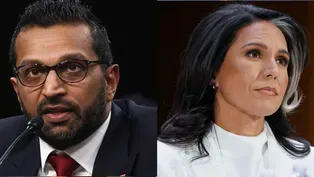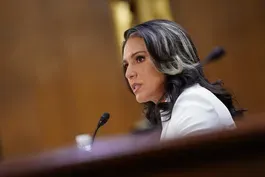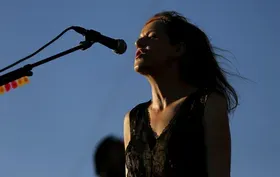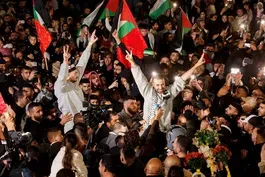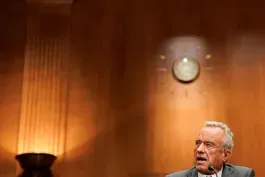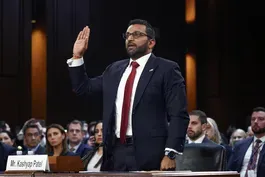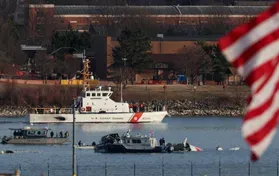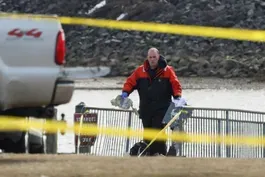
Congo's foreign minister describes rebel offensive
Clip: 1/30/2025 | 6m 49sVideo has Closed Captions
Congo's foreign minister describes unstable conditions as rebels seize territory
Parts of the Democratic Republic of the Congo are under siege by a Rwanda-backed rebel group. The violence has killed UN peacekeepers, overwhelmed hospitals, displaced hundreds of thousands and sparked fears of a wider regional conflict. Amna Nawaz discussed more with Thérèse Kayikwamba Wagner, the Congolese minister of foreign affairs.
Major corporate funding for the PBS News Hour is provided by BDO, BNSF, Consumer Cellular, American Cruise Lines, and Raymond James. Funding for the PBS NewsHour Weekend is provided by...

Congo's foreign minister describes rebel offensive
Clip: 1/30/2025 | 6m 49sVideo has Closed Captions
Parts of the Democratic Republic of the Congo are under siege by a Rwanda-backed rebel group. The violence has killed UN peacekeepers, overwhelmed hospitals, displaced hundreds of thousands and sparked fears of a wider regional conflict. Amna Nawaz discussed more with Thérèse Kayikwamba Wagner, the Congolese minister of foreign affairs.
How to Watch PBS News Hour
PBS News Hour is available to stream on pbs.org and the free PBS App, available on iPhone, Apple TV, Android TV, Android smartphones, Amazon Fire TV, Amazon Fire Tablet, Roku, Samsung Smart TV, and Vizio.
Providing Support for PBS.org
Learn Moreabout PBS online sponsorshipAMNA NAWAZ: Parts of the Democratic Republic of the Congo are under siege by a Rwanda-backed rebel group.
And, yesterday, Congo's president sent a clear message, vowing to fight back.
The M23 rebel group took control of Congo's Eastern city of Goma along the Rwandan border in an offensive launch last week, intensifying decades-long tensions and conflict between the two nations.
The latest violence has killed U.N. peacekeepers, overwhelmed hospitals, displaced hundreds of thousands of people, and sparked fears of a wider regional conflict.
For more now, I'm joined by Therese Kayikwamba Wagner, the Congolese minister of foreign affairs.
Madam Minister, welcome.
Thanks for being here.
THERESE KAYIKWAMBA WAGNER, Congolese Minister of Foreign Affairs: Thank you for having me.
AMNA NAWAZ: So can you just share with us the latest from any reports you have received on the ground about the situation in Goma?
Has there been any change in the pace or the ferocity of the fighting there?
THERESE KAYIKWAMBA WAGNER: As you mentioned, we are faced with a dramatic situation.
A very dire humanitarian situation that we have been observing for the past months has been exacerbated by the de facto occupation of sovereign Democratic Congo territory by the Rwandan Defense Forces.
This has led to the breakdown of all health infrastructures.
It has led also to the suppression of water and electricity supply and main access routes.
Congolese citizens and civilians do not have access to hospitals.
When they do, they face the risks that hospitals are being shelled.
We also have the very troubling fact that, within less than a week, 17 peacekeepers, United Nations peacekeepers, were killed in fighting with the Rwandan Defense Forces and their militia, the M23.
It is an extremely preoccupying situation when it comes to the humanitarian aspect, but also the regional peace that is at stake.
AMNA NAWAZ: Now, you mentioned the Rwandan Defense Forces.
We should point out the Rwanda says that they are not backing this M23 rebel group.
Do you have verifiable proof that they are behind them?
THERESE KAYIKWAMBA WAGNER: Of course.
Of course.
First of all, I want to refer us to the report of the United Nations group of experts.
This is not a report that was drafted by the Congolese government.
This is a group of experts that have been appointed by the United Nations Security Council.
In December, they spoke of about 4,000 Rwandan defense troops present in the DRC.
We believe that, in the last spurt of attacks against the DRC, even more troops crossed over.
I also want to refer us to the two last meetings, emergency meetings, of the United Nations Security Council, in which all of the members of the united Security Council denounced the presence of Rwandan troops on the ground.
So we find ourselves in a situation where all the world is cognizant of the fact that Rwandan defense troops are on the ground.
Everyone is saying it.
The media, which is on the ground, is saying it too.
And the only voice that claims that this is not true is the Rwandan voice.
AMNA NAWAZ: For anyone unfamiliar, can you kind of briefly explain why this area in particular is of such strategic importance, why there's fighting there now?
THERESE KAYIKWAMBA WAGNER: So, the Rwandan Defense Forces have been occupying very strategic areas in Eastern DRC.
I want to speak about Rubaya.
Rubaya is mined in all of the region.
According to United Nations experts, Rwandan Defense Forces have used forced labor to force labor to force children, women, and men to mine artisanal mines to get coltan.
And in a month, the Rwandan Defense Forces exploit and transfer over 150 metric tons of coltan that are then shipped over to Rwanda and exported to global markets under the label of Rwandan minerals.
So we see that this is an endeavor that is economically driven and that has no compunction whatsoever to violate human rights, to displace thousands, if not millions of civilians, and also, again, to kill peacekeepers that have been sent by the United Nations to bring peace and not to be killed.
AMNA NAWAZ: You mentioned the United Nations Security Council.
You said just this week to that council that Congo has been raising the alarm about this M23 group for the past three years.
What do you think that the U.N. or the international community could have done that they didn't do that would have prevented this situation from escalating the way it is today, and what can they do now?
THERESE KAYIKWAMBA WAGNER: So it is important to highlight that this situation we're facing right now, the imminent M23 crisis, is part of a larger history.
It is part of three decades of President Kagame being unpunished and uncontrolled by the international community.
This is not the first iteration of the M23.
I myself worked as a humanitarian in 2012 when the M23 took over Goma, again co-piloted by the Rwandan Defense Forces.
Now, looking at what could have been done, the first point was calling out Rwanda.
It took a very long time.
And we welcome the fact that it was the United States of America that were the first country in the United Nations Security Council to explicitly name Rwanda as the stakeholder or as the country occupying parts of the DRC.
And it took a while, but, gradually, we saw that other members of the council took on.
So action could have been taken earlier, but action can also be taken now.
First of all is demanding the full withdrawal of Rwandan defense troops from the DRC, second of all, imposing an embargo on all minerals that Rwanda is exporting to the global market under the label of Rwanda, well knowing that they are mined illegally in the DRC.
Third of all, Rwanda no longer deserves to contribute troops to United Nations peacekeeping missions.
Rwanda has been depicting itself for the past years as a true contributing country, bringing peace to other countries, but we see in the DRC that Rwanda is a warmonger.
This should no longer be tolerated.
AMNA NAWAZ: If those actions aren't taken, what happens on the ground?
THERESE KAYIKWAMBA WAGNER: If those actions aren't taken, what happens on the ground is that the objective of Kigali continues taking shape.
So we are seeing now that the M23, this propped-up rebel group, is now claiming to want to march all the way to Kinshasa and topple a sovereignly elected government.
Rwanda is engaging in state-sponsored regime changed.
And it is very important to highlight that this would be throwing the entire region, if not the whole continent, decades back.
All the investments of the United Nations, all the investment also of partner countries, like the USA, risk to have been for naught because the region risks to be plunged in chaos.
AMNA NAWAZ: That is the Congolese minister of foreign affairs, Therese Kayikwamba Wagner.
Madam Minister, thank you for being here.
THERESE KAYIKWAMBA WAGNER: Thank you for having me.
Experts weigh in on concerns surrounding Gabbard, Patel
Video has Closed Captions
National security experts share thoughts on concerns surrounding Gabbard and Patel (7m 55s)
Gabbard appears headed to a close vote in Senate
Video has Closed Captions
National intelligence nominee Gabbard faces tough questions over Russia, Syria and Snowden (4m 23s)
Neko Case reveals difficult journey to stardom in new book
Video has Closed Captions
Neko Case reveals difficult journey to stardom in 'The Harder I Fight the More I Love You' (6m 31s)
News Wrap: Hamas frees 8 hostages in 3rd round of exchanges
Video has Closed Captions
News Wrap: Hamas frees 8 hostages, Israel releases 100 prisoners in 3rd round of exchanges (4m 50s)
Republican senators express doubts about RFK Jr. in hearing
Video has Closed Captions
Republican senators express doubts about RFK Jr. in latest confirmation hearing (3m 48s)
Senators ask FBI director nominee Patel about 'enemies list'
Video has Closed Captions
Senators ask FBI director nominee Kash Patel about 'enemies list' and politicization (3m 35s)
What investigators revealed about the plane crash in D.C.
Video has Closed Captions
What investigators revealed about the jet and helicopter collision in D.C. that killed 67 (7m 57s)
What led up to the worst U.S. aviation disaster since 2001
Video has Closed Captions
Breaking down the moments that led up to the worst U.S. aviation disaster since 2001 (6m 23s)
Providing Support for PBS.org
Learn Moreabout PBS online sponsorshipMajor corporate funding for the PBS News Hour is provided by BDO, BNSF, Consumer Cellular, American Cruise Lines, and Raymond James. Funding for the PBS NewsHour Weekend is provided by...

